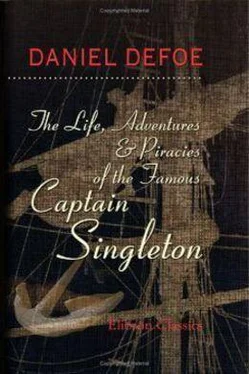D . How can I answer that? How can I tell what he intends?
W . Thou canst tell what thou believest.
D . I cannot say but he will perform it; I believe he may.
W . Thou art but a double–tongued Christian, I doubt. Come, I'll ask thee another question: Wilt thou say that thou believest it, and that thou wouldst advise me to believe it, and put our lives into their hands upon these promises?
D . I am not to be your adviser.
W . Thou art perhaps afraid to speak thy mind, because thou art in their power. Pray, do any of them understand what thou and I say? Can they speak Dutch?
D . No, not one of them; I have no apprehensions upon that account at all.
W . Why, then, answer me plainly, if thou art a Christian: Is it safe for us to venture upon their words, to put ourselves into their hands, and come on shore?
D . You put it very home to me. Pray let me ask you another question: Are you in any likelihood of getting your ship off, if you refuse it?
W . Yes, yes, we shall get off the ship; now the storm is over we don't fear it.
D . Then I cannot say it is best for you to trust them.
W . Well, it is honestly said.
D . But what shall I say to them?
W . Give them good words, as they give us.
D . What good words?
W . Why, let them tell the king that we are strangers, who were driven on his coast by a great storm; that we thank him very kindly for his offer of civility to us, which, if we are further distressed, we will accept thankfully; but that at present we have no occasion to come on shore; and besides, that we cannot safely leave the ship in the present condition she is in; but that we are obliged to take care of her, in order to get her off; and expect, in a tide or two more, to get her quite clear, and at an anchor.
D . But he will expect you to come on shore, then, to visit him, and make him some present for his civility.
W . When we have got our ship clear, and stopped the leaks, we will pay our respects to him.
D . Nay, you may as well come to him now as then.
W . Nay, hold, friend; I did not say we would come to him then: you talked of making him a present, that is to pay our respects to him, is it not?
D . Well, but I will tell him that you will come on shore to him when your ship is got off.
W . I have nothing to say to that; you may tell him what you think fit.
D . But he will be in a great rage if I do not.
W . Who will he be in a great rage at?
D . At you.
W . What occasion have we to value that?
D . Why, he will send all his army down against you.
W . And what if they were all here just now? What dost thou suppose they could do to us?
D . He would expect they should burn your ships and bring you all to him.
W . Tell him, if he should try, he may catch a Tartar.
D . He has a world of men.
W . Has he any ships?
D . No, he has no ships.
W . Nor boats?
D . No, nor boats.
W . Why, what then do you think we care for his men? What canst thou do now to us, if thou hadst a hundred thousand with thee?
D . Oh! they might set you on fire.
W . Set us a–firing, thou meanest; that they might indeed; but set us on fire they shall not; they may try, at their peril, and we shall make mad work with your hundred thousand men, if they come within reach of our guns, I assure thee.
D . But what if the king gives you hostages for your safety?
W . Whom can he give but mere slaves and servants like thyself, whose lives he no more values than we an English hound?
D . Whom do you demand for hostages?
W . Himself and your worship.
D . What would you do with him?
W . Do with him as he would do with us—cut his head off.
D . And what would you do with me?
W . Do with thee? We would carry thee home into thine own country; and, though thou deservest the gallows, we would make a man and a Christian of thee again, and not do by thee as thou wouldst have done by us—betray thee to a parcel of merciless, savage pagans, that know no God, nor how to show mercy to man.
D . You put a thought in my head that I will speak to you about to–morrow.
Thus they went away, and William came on board, and gave us a full account of his parley with the old Dutchman, which was very diverting, and to me instructing; for I had abundance of reason to acknowledge William had made a better judgment of things than I.
It was our good fortune to get our ship off that very night, and to bring her to an anchor at about a mile and a half farther out, and in deep water, to our great satisfaction; so that we had no need to fear the Dutchman's king, with his hundred thousand men; and indeed we had some sport with them the next day, when they came down, a vast prodigious multitude of them, very few less in number, in our imagination, than a hundred thousand, with some elephants; though, if it had been an army of elephants, they could have done us no harm; for we were fairly at our anchor now, and out of their reach. And indeed we thought ourselves more out of their reach than we really were; and it was ten thousand to one that we had not been fast aground again, for the wind blowing off shore, though it made the water smooth where we lay, yet it blew the ebb farther out than usual, and we could easily perceive the sand, which we touched upon before, lay in the shape of a half–moon, and surrounded us with two horns of it, so that we lay in the middle or centre of it, as in a round bay, safe just as we were, and in deep water, but present death, as it were, on the right hand and on the left, for the two horns or points of the sand reached out beyond where our ship lay near two miles.
On that part of the sand which lay on our east side, this misguided multitude extended themselves; and being, most of them, not above their knees, or most of them not above ankle–deep in the water, they as it were surrounded us on that side, and on the side of the mainland, and a little way on the other side of the sand, standing in a half–circle, or rather three–fifths of a circle, for about six miles in length. The other horn, or point of the sand, which lay on our west side, being not quite so shallow, they could not extend themselves upon it so far.
They little thought what service they had done us, and how unwittingly, and by the greatest ignorance, they had made themselves pilots to us, while we, having not sounded the place, might have been lost before we were aware. It is true we might have sounded our new harbour before we had ventured out, but I cannot say for certain whether we should or not; for I, for my part, had not the least suspicion of what our real case was; however, I say, perhaps, before we had weighed, we should have looked about us a little. I am sure we ought to have done it; for, besides these armies of human furies, we had a very leaky ship, and all our pumps could hardly keep the water from growing upon us, and our carpenters were overboard, working to find out and stop the wounds we had received, heeling her first on the one side, and then on the other; and it was very diverting to see how, when our men heeled the ship over to the side next the wild army that stood on the east horn of the sand, they were so amazed, between fright and joy, that it put them into a kind of confusion, calling to one another, hallooing and skreeking, in a manner that it is impossible to describe.
While we were doing this, for we were in a great hurry you may be sure, and all hands at work, as well at the stopping our leaks as repairing our rigging and sails, which had received a great deal of damage, and also in rigging a new main–top–mast and the like;—I say, while we were doing all this, we perceived a body of men, of near a thousand, move from that part of the army of the barbarians that lay at the bottom of the sandy bay, and came all along the water's edge, round the sand, till they stood just on our broadside east, and were within about half–a–mile of us. Then we saw the Dutchman come forward nearer to us, and all alone, with his white flag and all his motions, just as before, and there he stood.
Читать дальше












